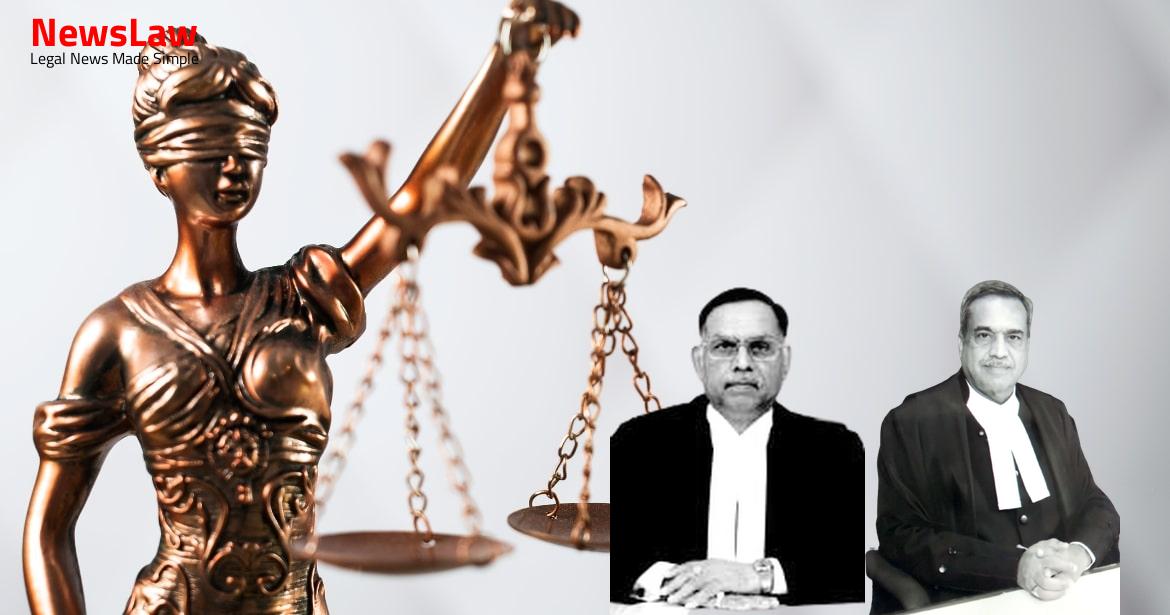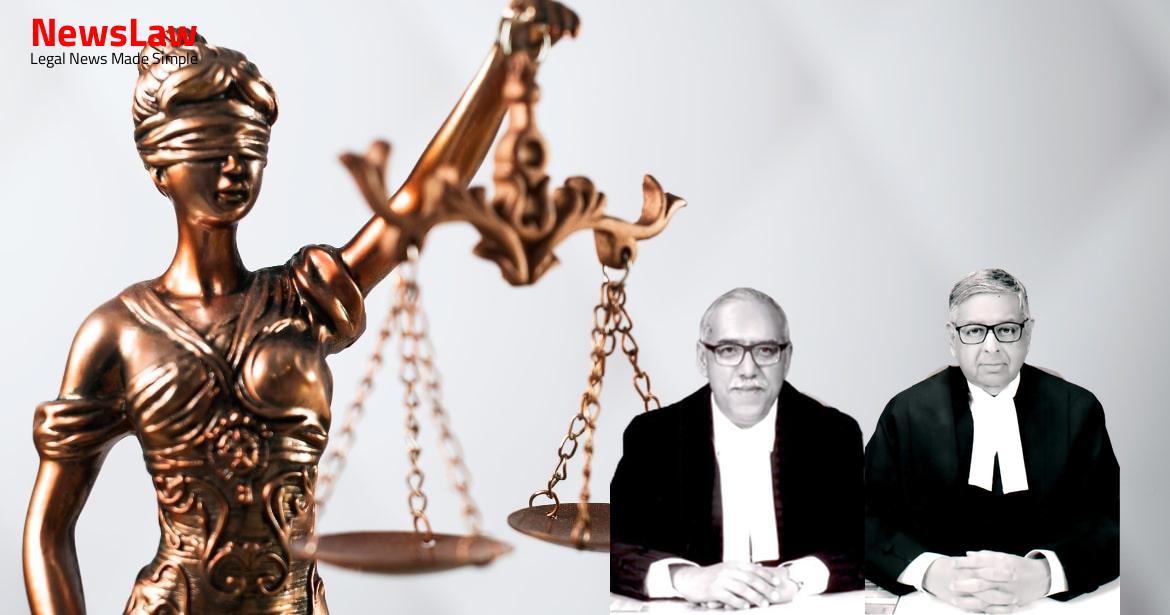In the case of Ranger Export of India vs. Accused, the original complainant sought justice under Section 138 of the N.I. Act. The Metropolitan Magistrate acquitted the accused, but the High Court’s decision was overturned on appeal. The accused, now held guilty, have been sentenced to imprisonment and fines for their actions. This case highlights the importance of legal provisions in ensuring justice for all parties involved.
Facts
- The original complainant is aggrieved by the judgment and order of acquittal passed by the Learned Trial Court and confirmed by the High Court.
- The Metropolitan Magistrate believed receipt of the demand notice by the accused persons and non-payment towards the cheque.
- However, the legal liability was not established as payment through the card was not proved.
- The complaint was dismissed by the Metropolitan Magistrate on 20.01.2017.
- The appeal filed by the complainant before the Sessions Court was also dismissed.
- The High Court, in the impugned judgment, confirmed the order of acquittal passed by the Trial Court.
- The appellant’s counsel argues that both the Trial Court and the High Court erred in acquitting the accused under Section 138 of the N.I. Act.
- Accused did not make payment of the cheque amount despite notice
- Complainant sent legal notice under Section 138 of the N.I. Act
- Cheque was dishonored due to ‘STOP PAYMENT’
- Complaint filed before the Metropolitan Magistrate
- Cheque issued by accused in discharge of legal liability
- Accused approached appellant for Foreign Exchange
- Total sum of Rs.19,01,320/- paid to accused through VTM
- Accused withdrew amounts on different days
- Balance of Rs.12,55,513/- remained unpaid
- Accused issued four dishonored cheques totaling Rs.9,55,574/-
- Accused admitted his signature on the cheque
Also Read: Court’s Analysis on Interim Order for Appointing Contractual Employees
Arguments
- The complainant misused the cheque to recover business dues from Ranger Export of India.
- No evidence has been presented by the accused to rebut the presumption under Section 139 of the N.I. Act.
- The accused admitted to taking services of the Foreign Exchange and Travel Card.
- Both courts below did not consider the presumption in favor of the complainant under Section 139 of the N.I. Act.
- The accused admitted to issuing the cheque and the signature on it.
- The onus is on the accused to rebut the presumption under Section 139 of the N.I. Act.
- The accused was required to prove that the entire amount due has been paid.
- The Trial Court should have convicted the accused based on the presumption under Section 139 of the N.I. Act.
- The High Court erred in confirming the acquittal.
- Learned Counsel for the accused argued that the accused has rebutted the presumption under Section 139 of the N.I. Act and proved the absence of legal liability to the complainant.
- Citing the case of Basalingappa vs. Mudibasappa, it was emphasized that once a probable defense is shown by the accused, the burden shifts to the complainant to prove their financial capacity and other relevant facts.
- The submission made was to dismiss the present appeal based on the above arguments and case law.
- The Learned Trial Court had specifically found that the complainant failed to prove the legal liability or dues of the accused for which the cheque was issued.
Also Read: Analysis of Legal Jurisdiction and Fraud Allegations in a Banking Case
Analysis
- The accused claimed that the cheque was given as security but failed to provide evidence to support this claim.
- The cheque in question was issued for the second time after earlier cheques were dishonored.
- The accused admitted to issuing the cheque bearing his signature, creating a presumption of a legally enforceable debt under Section 139 of the N.I. Act.
- The accused’s defense that the cheques were given as security lacked credibility without further evidence, especially since the cheque in question was issued after previous dishonored cheques.
- The presumption under Section 139 is rebuttable, allowing the accused to contest the existence of a debt or liability.
- The accused denied the debt liability during the proceedings under Section 138 and questioned the complainant’s financial capacity.
- The courts erred in not properly considering the presumption of a legally enforceable debt in favor of the complainant.
- When the accused questioned the financial capacity of the complainant, the burden shifted to the complainant to prove his financial capacity.
- Despite the presumption, the complainant failed to prove his financial capacity, leading to the acquittal of the accused.
- The accused did not dispute the transactions between the parties but failed to provide evidence that the full amount due was paid.
- The accused was required to lead evidence to rebut the presumption under Section 139 by proving full payment to the complainant.
- The decisions of the court discussed the importance of the presumption under Section 139 in cases under Section 138 of the N.I. Act.
- The evidence on record confirmed the issuance of the cheque by the accused, with his signature, and the admission of some amount due and payable.
- While the presumption under Section 139 was present, the accused needed to provide evidence of full payment to rebut the presumption.
- The judgment of the court is based on a consideration of the evidence and the acquittal of the accused by the lower courts for the offense under Section 138 of the N.I. Act.
- The material on record indicates that the accused did not dispute the issuance of the cheque or his signature, creating a prima facie case for the complainant.
- Section 139 of the Negotiable Instruments Act provides that unless the contrary is proved, it shall be presumed that the holder of a cheque received it for the discharge of a debt or liability.
- Presumptions, as per the Evidence Act, can be rebuttable, and the burden of proof lies on the party to show the real fact contrary to the presumption.
- The use of phrases like ‘until the contrary is proved’ in Section 118 and ‘unless the contrary is proved’ in Section 139 of the Act indicate that the presumptions are rebuttable.
- Accused can adduce evidence to rebut the presumption under Section 139, but mere denial of the existence of a debt is not sufficient.
- Section 139 of the Act serves the legislative objective of enhancing the credibility of negotiable instruments by placing a reverse onus on the accused.
- There exists a presumption in favor of the complainant regarding the existence of a legally enforceable debt or liability under Section 139 of the Act.
- The impugned judgment and order passed by the High Court and the Metropolitan Magistrate acquitting the accused for the offence under Section 138 of the N.I. Act are quashed and set aside.
- Error was committed by both the Trial Court and the High Court in shifting the burden of proof onto the complainant without considering the presumption under Section 139 of the N.I. Act.
- Section 139 of the Act establishes a reverse onus clause, creating a presumption in favor of the complainant once the issuance and signature on the cheque are admitted.
- It is then the responsibility of the accused to rebut this presumption by presenting evidence.
Also Read: The Supremacy of Pharmacy Act in Regulating Pharmacy Education
Decision
- The appeal arising from the impugned judgment and order passed by the High Court in Crl. L.P. No. 259/2018 is related to the acquittal of the original accused for the offense under Section 138 of the N.I. Act.
- Both the High Court and the trial Court acquitted the original accused, but the decision is being overturned in this appeal.
- The original accused – respondents (Accused No. 2 to 4) are now held guilty for the offense under Section 138 of the N.I. Act.
- They are sentenced to three months simple imprisonment with a fine of Rs. 10,000 each, with a one-month additional imprisonment in case of default.
- A compensation amount of Rs. 8,00,000 and Rs. 19,11,148 is ordered to be paid to the original complainant by the accused within eight weeks.
- All the original accused – respondents are convicted under Section 138 of the N.I. Act.
Case Title: APS FOREX SERVICES PVT LTD Vs. SHAKTI INTERNATIONAL FASHION LINKERS (2020 INSC 195)
Case Number: Crl.A. No.-000271-000271 / 2020



